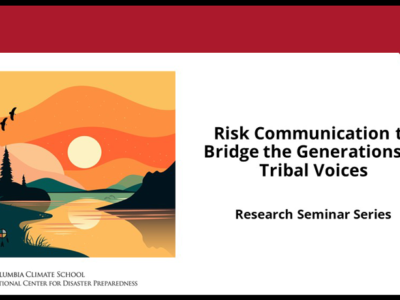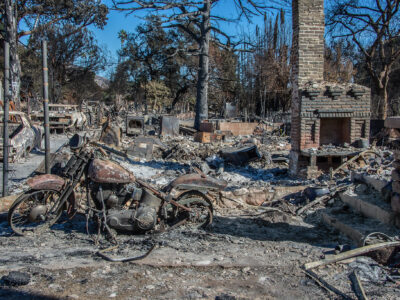
The National Center for Disaster Preparedness at the Earth Institute at Columbia University works to understand and improve the nation’s capacity to prepare for, respond to and recover from disasters. The center focuses on the readiness of governmental and non-governmental systems; the complexities of population recovery; the power of community engagement; and the risks of human vulnerability, with a particular focus on children.
The center maintains a strong working partnership with the Children’s Health Fund, a national organization that supports pediatric care for underserved children. Over the past decade, the center has engaged in a number of projects funded by the fund, which recently announced its renewed support with a $2.5 million pledge. Central to this collaboration has been a focus on several areas of mutual interest – preparing children, families, communities and health care systems for disastrous events; examining the impacts of disasters on vulnerable populations, particularly children; exploring the relationship between policy and practice as it relates to reconstituting families and communities in a disaster’s aftermath; and generally, providing a mechanism for consultation, training, or direct disaster response in coordination with the Children’s Health Fund.
An illustration of the strength of this collaboration is the work that the center has done together with the Children’s Health Fund in the Gulf Coast in the aftermath of the Deepwater Horizon Oil Spill and more recently after Superstorm Sandy. In the Gulf Coast, the center joined staff from the Children’s Health Fund on a site visit to Louisiana’s Plaquemines Parish, worked together to conduct town hall meetings and focus groups, conducted a population survey to identify needs and concerns of affected residents, and more recently has developed the SHOREline youth empowerment program and curriculum in multiple Gulf Coast high schools. After Superstorm Sandy, center staff accompanied Children’s Health Fund staff during the rapid assessment phase, helping to determine areas of greatest need for the fund’s clinical services.
With the generous support of the Children’s Health Fund, the National Center for Disaster Preparedness has continued to pursue the following five questions:
- What are the short-term and long-term effects of disasters and public health emergencies on children and families?
- How do medical and public health systems help prevent, mitigate or respond to the needs of children and families threatened by public health emergencies or disasters?
- What factors contribute to, or impede, children’s and family’s recovery in the aftermath of a public health emergency or disaster?
- What can the Children’s Health Fund – as a central operating authority, or as a confederation of loosely-knit medical units, personnel and health care institutions – do to prevent, mitigate, or respond to public health emergencies and disasters?
- What role does public policy play in facilitating or impeding the formal and informal systems supporting children and families at risk of or affected by public health emergencies or disasters?
Children’s Health Fund funding has helped to develop research and assessment proposals, develop white papers and articles on preparedness and care coordination, and develop curricular training related to children and disasters. To answer the above questions and support the mission of this collaborative relationship between the center and the fund, the center continues to engage in the following principal areas of work: (1) research in the Gulf Coast, exploring the impacts of both Hurricane Katrina and the Deepwater Horizon oil spill; (2) analysis of public health medical systems, including the institutions, norms, and rules that govern their organizational behavior (this could include an examination of triage decisions, altered standards of care, or allocation of scarce resources, among other potential topics); and (3) development of an online learning environment that may be accessed by the Children’s Health Fund network to enhance their system readiness, personal preparedness, and as a vehicle for just-in-time training, in the event of an actual public health emergency or disaster.
This renewed funding will go a long way to continue this important research and fruitful collaboration. National Center for Disaster Preparedness director and founder Dr. Irwin Redlener is a pediatrician and national children’s health expert who co-founded the Children’s Health Fund with singer-songwriter Paul Simon in 1987. He has also recently served as one of 10 members of the National Commission on Children and Disasters, appointed by Congress and the president.
To learn more about the National Center for Disaster Preparedness, visit their website here: http://ncdp.columbia.edu/



